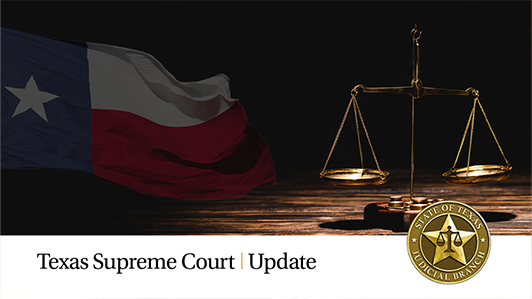
The following is a summary of selected opinions issued by the Texas Supreme Court in May 2025. This summary is prepared by court staff as a courtesy. It is not a substitute for the actual opinion. The summary is an overview; please review the entire opinion.
Ferchichi v. Whataburger Rests. LLC and Haven at Thorpe Lane, PLLC v. Pate, ____ S.W.3d _____, 2025 WL _____ (Tex. May 9, 2025) [23-0568, 23-0993]
These cases, consolidated for oral argument, address the scope of the term “legal action” in the Texas Citizens Participation Act.
In Ferchichi, Ferchichi filed a discovery-related motion to compel and for sanctions after Whataburger allegedly failed to disclose an investigative video for Ferchichi prior to mediation. In Haven, Haven filed a discovery-related motion to compel and for sanctions, arguing that Pate, a nonparty Haven served with a subpoena duces tecum, failed to fully comply with the subpoena. Pursuant to the TCPA, Whataburger and Pate filed motions to dismiss these motions. Both trial courts denied the motions. Both courts of appeals reversed, holding that the TCPA applied to the sanctions motion. The courts concluded that because the motions sought additional relief in the form of monetary sanctions, they fell within the TCPA’s definition of “legal actions”: “a lawsuit, cause of action, petition, complaint, cross-claim, or counterclaim or any other judicial pleading or filing that requests legal, declaratory, or equitable relief.”
The Supreme Court reversed. Whataburger and Pate argued that the sanctions motions were legal actions to which the TCPA applied, relying on the catch-all provision in the Act’s definition of “legal action.” The Court applied the doctrine of ejusdem generis to limit that catch-all provision. It concluded that the judicial filings specifically listed in the definition serve the function of commencing or materially amending a proceeding on a substantive legal claim. So, the catch-all is limited to pleadings or filings that do the same. Further supporting that conclusion, the TCPA excludes from the definition of “legal action” “a procedural action taken or motion made in an action that does not amend or add a claim for legal, equitable, or declaratory relief.” Ferchichi’s and Haven’s discovery-related motions to compel and for sanctions did not commence or materially amend a proceeding on a substantive legal claim and thus are not “legal action[s]” under the TCPA. Accordingly, the TCPA is inapplicable, and the courts of appeals erred in holding that Whataburger’s and Pate’s TCPA motions should have been granted. The Court remanded the cases to the respective trial courts for further proceedings.
